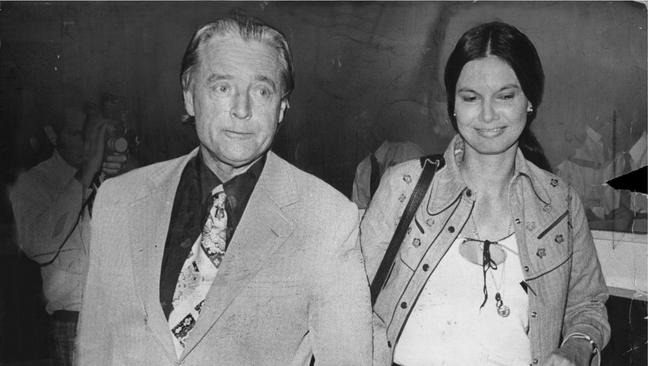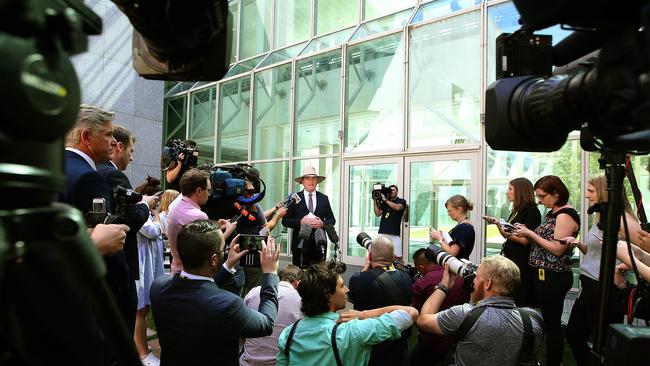Barnaby Joyce: Junie Morosi misreads train wreck at every level
The public is fascinated by the way Barnaby Joyce has blown up his life. It’s a train wreck from which we can’t look away.

In the mid-1970s, the deputy prime minister at the time, Jim Cairns, found himself engulfed by a wild sexual scandal. Cairns and one of his staff, Junie Morosi, were portrayed in the media as having an affair, and both of them rejected the allegations, vehemently.
The media was accused of telling outrageous lies, and Cairns and Morosi took various entities to court for defamation of character. In 1977, Morosi won $17,000 from The Daily Mirror, and in 1978 $10,000 from radio 2GB.
In 1982, Cairns was asked in court whether he had ever had an adulterous relationship and he replied: “No, never.” However in 2002, during an interview on ABC radio, he confessed to the affair. When pressed about the previous denials, he said he didn’t tell anyone the truth 20 years earlier “because nobody asked if I’d been to bed with her”. How’s that for breathtaking spin and disgusting justification of rank deception?
This week, Morosi emerged from the past to lambaste the media for its coverage of Barnaby Joyce. Our interest in the Deputy Prime Minister’s troubles had little to do with the misuse of public expenditure; we are “old-fashioned” puritans, apparently, and the focus on him is “passe” and exhibiting an “old consciousness”.
In these hip times, where “gay marriage has brought out the right of anyone to love whom they want to love, it really shouldn’t be anyone’s business except for him and his family”, she said, adding: “I think young people today, and most people today, are not interested in that story.”
Morosi came across as self-righteous without cause because the public record reflects badly on Cairns and her. It is great they had so much good fun. How wonderful for them that they got away with their deception, but perhaps in the light of the 2002 admission the $27,000 should be paid back?

In Canberra, insiders refer to Joyce as “the bonking beetroot”. This nickname has been around for a while and is considered affectionate. It captures the imagination beautifully, don’t you think? Although it must be said that the picture it paints raises health concerns — strenuous exertion can lead to high blood pressure.
Joyce is also known as Australia’s best “retail politician”. This means people like Joyce, they like to hear him speak and they like to read about him, too. Joyce is a warts-and-all man and anything but boring. He is the sort of man who will give you the bad news right between the eyes, and people tend to respect that.
So here is where Morosi is wrong. The public is fascinated by the way Joyce has blown up his life and whether there has been any wrongdoing, by which I mean misuse of privileges granted by the public purse. We know this because technology shows that readers cannot get enough of anything written on the topic. Because we like Joyce, and his life is a train wreck right now, it is a train wreck from which we cannot look away.
Morosi is wrong about another thing, too. The media does have an interest in the issue of public expenditure and whether it has been abused. We know Australians are not nosy perverts who want cheap thrills and smutty titillation; it is just that everyone is fed up to the back teeth with the game in Canberra. We are sick to death of the way people who are supposed to be running the country “take the piss” with publicly funded high jinks, rorts and general carry-on.

If politicians are abusing their power, privileges and entitlements, the media must expose this and hold them accountable.
We are not puritans. No one cares if politicians are getting their jollies off in their own time and at their own expense, but we do care when we are asked to pay for it.
So the lesson for Canberra types is this: do what you want in your own time and do it at your own expense. And if you want to keep something private, then pay for it yourself, down to the very last cent.
One good thing to come out of this godawful mess is a baby who will be kept by its biological parents and no doubt grandly loved. In the old days, and by that I mean the 70s, many babies born in such circumstances were taken forcibly, or discarded, given away like unwanted puppies, and put up for adoption. It is good that we live in modern times, where old-fashioned puritan attitudes don’t exist to the extent they once did.






To join the conversation, please log in. Don't have an account? Register
Join the conversation, you are commenting as Logout